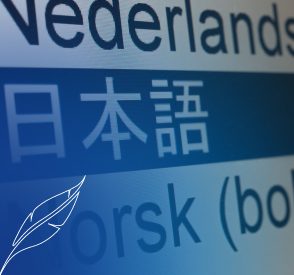Language localisation is an investment that pays off

Studies* show that 76% of online shoppers prefer shopping on websites that contain information in their native languages. And up to 40% of potential customers said they will never make a purchase from a website in a language they do not understand. Thus, companies that provide content only in English receive less revenue and achieve their sales targets slower.
Let's now take a look at consumer evaluations of localization services for online stores.
Building trust
Customers like having product information in their own language since it makes it easier for them to grasp the features of the product and lowers the possibility of misunderstandings and complaints. For instance, when selecting a new computer, reading about the product's specifications in English rather than any other language gives us far more confidence. Not only do people who understand English less well want to obtain product information in their own language from an online store, but people who have flawless English as well. According to the above-mentioned study, this figure is as high as 60%. Thus, consumers are more confident buying on a localised website and their trust in the brand grows.
More loyal customers
It is also important for shoppers to be able to easily communicate with customer service staff. The pleasure of solving an issue can occasionally be ruined by sloppy customer service communication. Around 70% of end consumers think they are more likely to use the services again if businesses offer help in their native tongue, the survey** on the language of customer service says.
Moreover, customer service in different languages leads to greater tolerance of consumers for product defects. This is supported by the aforementioned survey, which reveals that up to 62% of consumers are better understanding of product-related issues if they can engage with customer care representatives in their native tongues. Thus, localising the customer service area will increase the amount of devoted clients your business has.
Partial translation better than no translation?
Online shoppers expect at least some of the information on a website to be available in their native language. As many as 67% of consumers don't mind if some of the information is presented in English or another widely spoken language and some in their native tongue. Thus, even the language integrity of the website loses out to the most important factor of satisfaction – product information in the customer's native language. Interestingly, 73% of shoppers would like to find at least product reviews in their native languages when they purchase online. This suggests that localisation – even partial localisation – might influence a customer's decision to buy a good or service from your online business.
AIRV translation agency helps clients to establish themselves in the international market
Evelina Grigonė, head of AIRV translation agency, shares examples of clients who emphasise the importance of language localisation when working in the international markets: “We work with Ruptela and GoRamp, companies that develop transport management solutions, which aim to create the best possible user experience and provide their customers with all the information about services in their target languages – this creates a connection and trust in the company, development in target markets is much more efficient, and it is easier for customers to accept and love a new brand.”
Another example of language localisation is that such services are often outsourced to private companies providing medical services, the head of AIRV translation agency says. Customers come to the procedures of private medical institutions from all over the world, thus it is necessary to provide descriptions of the all available procedures, consents to plastic operations and explanations in the target languages, so that customers are comfortable about the services they receive. The necessary information is translated, even though most customers understand documents in English, for example. When immediate trust in the service provider is required, the information in the customer's native language plays one of the most important roles.
Customers who launched a new Italian brand in another nation and paid close attention to consistent Lithuanian communication, packaging, and product descriptions in Lithuanian are another excellent illustration of the significance of localization. As a result of localising product information, the company has successfully established itself on the Lithuanian market.
Another successful case from the Bags and More company demonstrates the significance of communicating with customers in their native tongues and operating an online store in the language that is most familiar to them, such as Latvian rather than English, when expanding into other Baltic countries. Let's face it, the majority of businesses tend to use English, which has become the universal language, but companies that are willing to go the extra mile for their customers and communicate in their mother tongues immediately win the competition and gain extra brand trust points.
The abundance of examples confirms once again that language localisation is a surefire path to commercial success in international markets or in Lithuania if your product is not made there. In order to secure company’s development and outstanding outcomes, localization and communication in the client's native tongue can be quite helpful.
* 2020 survey by CSA Research, an independent research company ** 2020 survey by Intercom, an international company.
